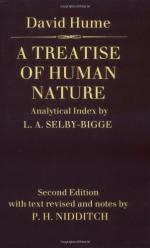
|
| Name: _________________________ | Period: ___________________ |
This quiz consists of 5 multiple choice and 5 short answer questions through Book 3, Part 3, Of the Other Virtues and Vices.
Multiple Choice Questions
1. By what does Hume say all human action is determined?
(a) Impressions.
(b) Love.
(c) Perception.
(d) Morals.
2. How does Hume define passions?
(a) Simple ideas evolving across time into simpler ones.
(b) Slow movements in your external world.
(c) Complex ideas of love and hate.
(d) Immediate sensations of your internal states.
3. Which virtues does Hume say are culturally evolved?
(a) Judgemental virtues.
(b) Artificial virtues.
(c) Vulgar virtues.
(d) Natural virtues.
4. Hume argues that reason is the slave of what?
(a) The will.
(b) The passions.
(c) Society.
(d) The emotions.
5. What does Hume say helps us produce belief?
(a) The external world.
(b) Imagination.
(c) Knowledge.
(d) The internal world.
Short Answer Questions
1. Hume says impressions are divided into what?
2. Why does Hume say we admire the rich and the powerful?
3. How does Hume define respect?
4. What kind of soul does Hume believe does not exist?
5. In what does Hume say he finds it difficult to put faith?
|
This section contains 221 words (approx. 1 page at 300 words per page) |

|




